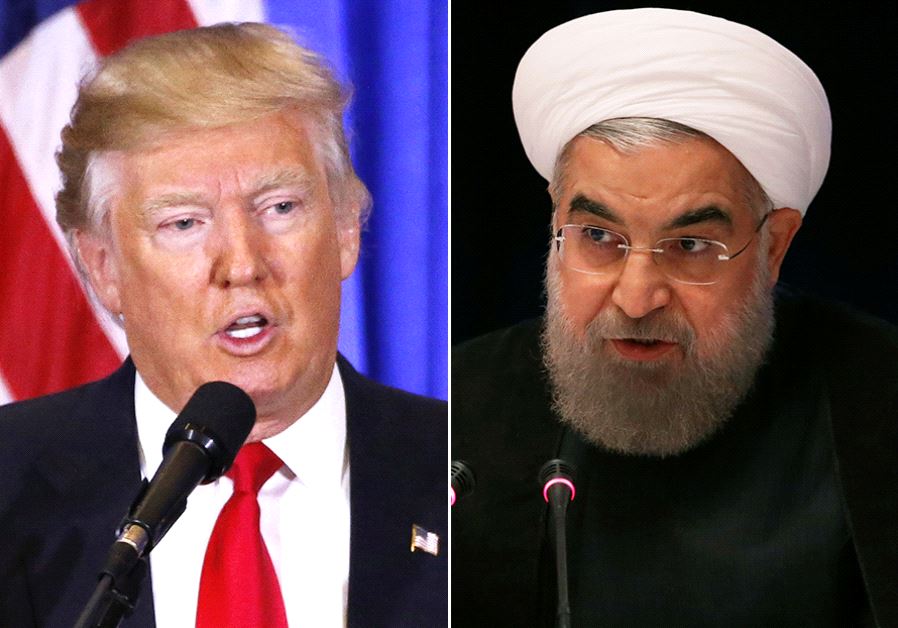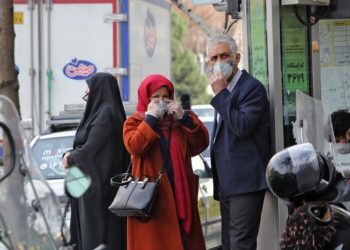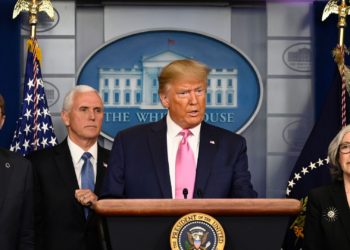After withdrawing from the 2015 Iran nuclear agreement in May, Donald Trump’s administration re-imposed oil and banking sanctions on Tehran on November 5.
The goal of the new round of sanctions – leaders in Washington say – is to wreak havoc on Iran’s economy in hopes of forcing Iranian leaders to renegotiate the nuclear agreement and ultimately accept terms that are more favorable to the United States.
While experts say that the sanctions will take a major toll on ordinary Iranian people, there is a broad consensus that Iran’s economy will likely be able to cope with the sanctions enough to avoid capitulating to Trump’s demands.
“There’s a difference between impact and effectiveness,” Holly Dagres, an Iran analyst at the Atlantic Council, said at a conference last week. “Just because the sanctions will have an impact on the economy and the Iranian people doesn’t necessarily mean they will have an effect on the behavior of Iran.”
America Isolated
One significant factor that will help Iran mitigate the impact of sanctions is that the country is no longer geopolitically isolated as it was before signing the nuclear agreement in 2015.
The agreement – officially known as the Joint Comprehensive Plan of Action – was signed by the U.S., Iran and five other countries – France, Russia, China, The United Kingdom, and Germany.
The U.S. is the only country that has withdrawn from the agreement. All of the other signatories maintain that Iran has not violated the agreement and have criticized the U.S. for pulling out of it.
Though the latest round of sanctions is very similar to those imposed by Barack Obama‘s administration, a major difference is that prior to the JCPOA, the sanctions were supported by the United Nations Security Council, the European Union, China, and Russia. This time, the U.S. is alone.
“This time around, unlike the Obama era, it is the U.S. that is isolated,” Muhammad Sahimi, an expert on Iranian energy and political development at the University of Southern California, told The Globe Post.
Iranians are bracing for a new round of U.S. sanctions that Pres. Trump plans to impose as early as next week.
The president hopes to severely limit Iran’s ability to sell oil as punishment for supporting terrorist groups.
@elizapalmer is in Tehran https://t.co/VUk01WkEv9 pic.twitter.com/aGomFX7eSa
— CBS Evening News (@CBSEveningNews) October 30, 2018
While some countries have been coerced into abiding by U.S. sanctions on Iranian oil, other powers, like China, have been defiant.
In October, China imported about 750 thousand barrels of Iranian oil per day – roughly half of all Iran’s oil exports.
While these imports open China up to U.S. sanctions, Washington has thus far backed down, issuing exemptions to avoid the triggering of sanctions and avoiding further economic escalation while the two countries continue their “trade war.”
Meanwhile, Iran’s second largest importer of oil, India, has significantly reduced imports since May. But with oil prices being an important domestic political issue, experts believe it’s highly unlikely that New Delhi will ultimately stop importing Iranian oil completely.
Bartering, Smuggling, and Fraud
Iran has had ample time to prepare for the reimposition of sanctions since Trump won the presidential election in November of 2016.
In that time, the government began rationing supplies such as food and medicine as well as handing out “food baskets” to low-income families, according to Dagres.
To further try to mitigate the potentially devastating impacts sanctions could have on its citizens, Iran’s government is reportedly considering legislation to increase imports of essential goods and selling them at subsidized prices.
Other more creative strategies to skirt U.S. financial and banking sanctions are also apparently in the works.
“Some of them are based on barter agreements,” Sahimi said. “Iran will deliver oil, gas, petrochemicals and other exports, and in return receive what it needs, without needing to go through the [international banking] system.”
Iraq has agreed to trade food supplies for oil and gas. Even the European Union is considering creating a “special purpose vehicle” – a “sophisticated, multi-country bartering scheme” aimed at allowing European companies to continue to trade with Iran while avoiding sanctions.
Under the assumption that the Trump administration would never sanction a European central bank, European countries have also discussed using central banks to “collect hundreds or even thousands of planned transactions and ‘bundle’ them together, sending the funds to Iran in one lump sum that would then be redistributed to the intended recipients,” NBC News reports.
“Front companies” were a key part of prior Iranian strategies to cope with sanctions and will likely be again this time around.
While under international sanctions before signing the nuclear agreement, Iranians opened private banks and companies in Iraq – technically owned by Iraqi, Lebanese or Syrian citizens – to mask financial transactions.
“Iran has a presence in Iraq and the Iraqi government has its own problems with mismanagement and corruption, so you find there are front companies being opened,” Dagres said.
Fraud and forgery are also central parts of these strategies. “Wire stripping,” or removing or changing the identifying information of a bank transfer, can also help cloak money transfers to Iran.
For example, it was revealed in April that Bahrain’s Future Bank assisted Tehran in hiding $7 billion in transfers from 2004 to 2015 using this strategy.
Smuggling goods – including truckloads of U.S. dollars – through neighboring Iraq and Afghanistan became a lucrative industry under early sanctions and will likely be again as goods and currency become increasingly scarce.
In an effort to conceal oil sales – Iran and importer countries were also shown to have used “ghost tankers.” Iranian tankers would turn off trackers and transfer oil onto foreign tankers in the middle of the sea.
The Financial Times reported that at least seven Iranian tankers have stopped sending position signals since September 16, 2018.
Laws of Jungles
While all of these coping strategies will likely allow Iran’s economy to avoid complete collapse, U.S. financial and oil sanctions will nonetheless have long-reaching humanitarian and political impacts within Iran.
Despite the fact that there were exceptions made for humanitarian supplies under previous sanctions, Iranians still experienced enormous difficulties acquiring drugs and medical supplies from the West.
“They claim that the imports of medicines are exempted from sanctions but in practice, because of banking restrictions, we don’t have access to medicine,” Ahmad Ghavideh of Iran’s hemophilia society told the Guardian.
“Any delay in supply of medicine … will have catastrophic consequences. My worry is not for today, but in six months’ time when our supply runs out.”
With very limited access to Western medical supplies, Iranians are forced to turn to Chinese and Indian products that are often inferior and can lead to severe side effects.
“The worst thing I’ve seen is that the needles coming in from China have dry blood on them,” Dagres said an Iranian pharmacist told her.
But the humanitarian toll of sanctions goes far beyond medicine.
“If the banks are sanctioned that means you have sanctioned everything,” Trita Parsi, the founder and president of the National Iranian American Council, told The Globe Post. “It has a very negative impact on the entire social fabric of a country.”
According to Parsi, the civilian toll brought about by sanctions is “not a bug. It’s a feature.”
“The theory behind it is, you make the population so miserable that they will rise up against the government,” he said.
But Parsi, Dagres and Sahimi all agree that a popular uprising against the Iranian regime is highly unlikely.
In fact, even a U.S. government report from the Congressional Research Service acknowledges that the sanctions are further emboldening harliners within the regime and weakening support for moderates who argued in favor of a deal with the U.S. in the first place.
Nonetheless, the Trump administration is maintaining its “maximum pressure” course.
“What [the administration] wants is for the laws of jungles to prevail,” Sahimi said. “They will not.”



















